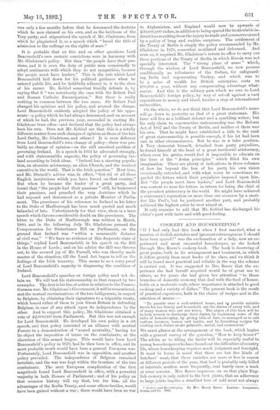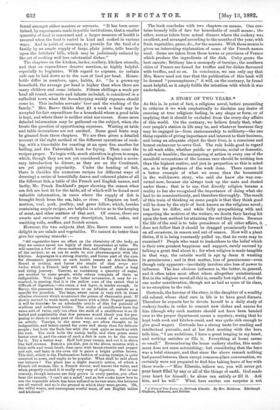COOKERY AND HOUSEKEEPING.*
"If I had only had this book when I first married, what a number of foolish mistakes and ignorant extravagances I should have been spared !" was the exclamation of a lady, now an ex perienced and most successful housekeeper, as she looked through Mrs. Reeve's cookery-book. The book is deserving of great praise, both in its arrangement and treatment, in which it differs greatly from most books of its class, and we think it will be found most practical and reliable in the way the scheme is carried out. It was suggested to Mrs. Reeve that the ex- perience she had herself acquired would be of great use to. others, as for years she had given her attention " to those branches of domestic economy that deal with the food of house- holds on a moderate scale, where importance is attached to good cooking and a variety of dishes." The present book is the result of practical experience, both in the choice of recipes and in the selection of menus :— " To preside over a well-ordered house, and tv provide suitable meals for her family and household, are the duties of every wife, and of many women who are not wives. The object of this book will be to help women to discharge their duties, by explaining some of the rates of housekeeping, by giving bills of fare, so arranged as to suit various incomes, tastes, and habits, and by furnishing recipes for cooking such dishes as are palatable, useful, and economical."
We must glance at the arrangement of the book, which begins with a general survey of the question, " How to keep house ?" The advice as to filling the larder will be especially useful to young housekeepers who have found out the difficulties of country life, where housekeeping requires much judgment and foresight. It must be borne in mind that there are but five kinds of butchers' meat, that these varieties are more or less in season at different periods of the year, that beef is probably only killed at intervals, mutton more frequently, veal barely once a week at some seasons. Mrs. Reeve impresses on us that plain Eng- lish cookery is only suited to the best joints, that an adherence to large joints implies a steadfast love of cold meat not always
•
Conkers and Housekeeping. By Mrs. Henry Reeve. London : Longman, Green. and Co. 18Ee.
found amongst either masters or servants. "It has been ascer- tained, by experiments made in public institutions, that a smaller quantity of food is consumed and a larger measure of health is secured when the food is varied in kind and cooked in various ways. And in point of economy, to provide for the food of a family by an ample supply of large, plain joints, tells heavily upon the butchers' bills, which may be judiciously reduced by the art of cooking well less substantial dishes."
The chapters on the kitchen, larder, scullery, kitchen utensils, and that on expenditure deserve mention, as highly helpful, especially to beginners. With regard to expense, no certain rule can be laid down as to the cost of food per head. House- holds differ in numbers, ages, habits, &c. "In a grown-up household, the average per head is higher than when there are many children and some infants. Fifteen shillings a week per head all round, servants and infants included, is considered in a cathedral town what the housekeeping weekly expenses should come to. This includes servants' beer and the washing of the family." Mrs. Reeve thinks that £1 a week a head may be accepted for fair expenditure for a household where a good table is kept, and where there is neither stint nor excess. Some more detailed information may be gathered on the subject, when she treats the question of apportioning expenses. Waiting at table and table decorations are not omitted. Some good hints may be gleaned from these chapters. We are then given a detailed account of the right method of the different operations of cook- ing, with a time-table for roasting at an open fire, another for boiling, and the Fahrenheit heat for frying. Then come the recipes proper. To begin with, much attention is given to soups, which, though they are not yet considered in England a neces- sary introduction to dinner, as they are on the Continent, are yet gaining popularity. Under the heading of fish, there is (besides the numerous recipes for different ways of dressing) a series of beautifully drawn and coloured plates of all the different fish, a table of the French and English names, and lastly, Mr. Frank Buckland's paper showing the season when sea fish are best fit for the table, all of which will be found most valuable information, in cases where the supply of fish is brought fresh from the sea, lake, or river. Chapters on beef, mutton, veal, pork, poultry, and game follow, which, besides -containing ample recipes, are helpful in advice as to the keeping of meat, and other matters of that sort. Of course, there are sweets and savouries of every description, bread, cakes, not omitting rolls, muffins, and Scotch scones.
However, the two subjects that Mrs. Reeve seems most to -delight in are salads and vegetables. We cannot do better than give her opening remarks :- "All vegetables have an effect on the chemistry of the body, so that we cannot speak too highly of their importance at table. We will mention a few of these matters first, and dispose of this aspect of the subject, so as not to see% to mix pharmacopoeia with the kitchen. Asparagus is a strong diuretic, and forms part of the cure for rheumatic patients at such health resorts as Aix-les-Bains. Sorrel is cooling, and forms the staple of that soupe aux herbes which a French lady will order for herself after a long and tiring journey. Carrots, as containing a quantity of sugar, are avoided by some people, while others complain of them as indigestible. With regard to the latter accusation, it may be re- marked, in passing, that it is the yellow core of the carrot that is difficult of digestion,—the outer, a red layer, is tender enough. In Savoy, the peasants have recourse to an infusion of carrots as a 43pecific for jaundice. The large, sweet onion is very rich in those alkaline elements which counteract the poison of rheumatic gout. If slowly stewed in weak broth, and-eaten with a little Nepaul pepper, it will be foandato be an admirable article of diet for patients of studious and sedentary habits. The stalks of cauliflower have the same sort of value, only too often the stalk of a cauliflower is so ill- boiled and unpalatable that few persons would thank you for pro- posing to them to make part of their meal consist of souninvitinc. an article. Turnips, in the same way, are often thought to be indigestible, and better.suited for cows and sheep than for delicate people ; but here the fault lies with the cook quite as much as with -the root. The cook boils the turnip badly, and then pours some butter over it, and the eater of such a dish is sure to be the worse for it. Try a better way. Half boil your turnip, and cut it in slices like half-crowns. Butter a pie-dish, put in the slices, moisten with a little milk and weak broth, dust once with bread-crumbs and pepper and salt, and bake in the oven till it gains a bright golden brown. This dish, which is the Piedmontese fashion of eating turnips, is quite unsuited to cows, and ought to be popular. What shall be said about our lettuces P The plant has a slight narcotic action, of which a French old woman, like a French doctor, well knows the value, and when properly cooked it is really very easy of digestion. But in our country, though lettuces are duly grown in every garden, you often hear the remark, 'I can't eat a salad,' and as few cooks know how to use the vegetable which has been refused in its raw state, the lettuces are all wasted, and so is the ground in which they were grown. Oh, the wilful waste, and consequent woeful want, of our English tables and kitchens !" The book concludes with two chapters on menus. One con- tains homely bills of fare for households of small means ; the other, menus taken from actual dinners where the cookery was excellent, and arranged according to the months of the year, with fruit, vegetables, game, &c., for the seasons. 'With these menus is given an interesting ekplanation of some of the French names used. Some are taken from those towns or provinces of France which produce the ingredients of the dish. Crky grows the best carrots ; Brittany has a monopoly of turnips ; the southern cities of France are famed for truffles and for dishes flavoured with truffles, and so on. In conclusion, we can only say that Mrs. Reeve need not fear that the publication of this book will he deemed " presumptuous ;" it will, on the contrary, be found most helpful, as it amply fulfils the intention with which it was undertaken.



































 Previous page
Previous page